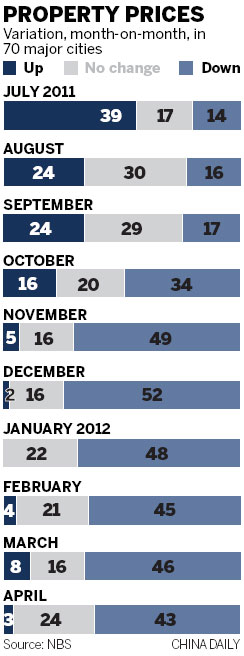Housing price decline spreading
But there may be a rebound in 4th quarter as buildup in supply eases
More cities in China saw property prices decline last month on an annual basis, but rebounding sales could push up prices in the coming months, analysts said.
Out of 70 major cities tracked by the government, 46 recorded a year-on-year price fall in April, eight more than in March, the National Bureau of Statistics said on Friday.
Month-on-month, 43 cities recorded a price fall, while 24 remained flat. In March, 46 cities posted a price decline from the previous month.
Nicole Wong, regional head of property research at CLSA Research Ltd, said there may be a small fourth-quarter rebound in property prices after a buildup in supply starts to gradually ease.
"We expect the property price to increase 5 percent in the fourth quarter, after a flat second and third quarter," said Wong.
"As both first-home buyers and property developers find it easier to get bank loans, we expect property sales will pick up," said Wong.
Zhang Xiaohong, a senior official with the Ministry of Housing and Urban-rural Development, said that a correction in real estate market will continue in the coming months.
China began taking steps to curb property prices in 2010. These included tighter lending policies, higher down payments, a ban on third-home purchases, property tax pilot plans and the construction of more low-income housing.
Government officials have repeatedly stated that the curbs will stay in place, even after economic growth slowed to a near three-year low of 8.1 percent in the first quarter.
Though the government won't ease the current curbs, it will be hard to add new ones, said Liu Feiguo, vice-president of E-Commercial China, a leading commercial property service provider.

The April home price data fueled concerns that a cooling property market will accelerate China's economic slowdown, as property development investment accounts for more than 10 percent of the country's GDP and affects many other industries.
These concerns dragged the benchmark Shanghai Composite Index down 1.44 percent to 2,344.52 points on Friday.
The State Information Center, a government think tank, said the property curbs, combined with sluggish external demand, will further weigh on the economy in the second quarter.
It forecast that GDP growth will slow further in the current quarter to 7.5 percent.
However, because of a sound employment situation, it is unnecessary to worry too much about the economic slowdown, the center said.
The People's Bank of China has cut banks' reserve requirement ratio by 0.5 percentage point to spur lending and stabilize growth.
The central bank lowered the RRR in November and again in February.
Housing rebound
Beijing's property sales, including new and pre-owned homes, saw a strong rebound in the first half of May, according to the real estate brokerage Century 21. It said 7,132 apartments were sold in the first 15 days of May, up 103 percent year-on-year. Sales of pre-owned homes jumped 75 percent to 5,645 units.
"Property developers' strategy of cutting prices to stimulate sales did work. Also, potential buyers' sentiment improved," said Su Ri, senior analyst from Century 21.
According to China Index Academy, the research unit of the country's largest real estate website SouFun Holding Ltd, about 60 percent of the cities it monitors saw a rebound in property sales last week on a yearly basis.
Suzhou, Xiamen, Wenzhou, Lanzhou and Haikou had a rebound of more than 100 percent.
Some property developers have even increased prices.
China Resources Land Ltd plans to launch the second phase of its Spanish-style villa project in Beijing next month, and prices will probably be more than 20 percent above those on the first phase launched in November.
"Market sentiment did improve compared with the end of last year. And the number of our potential buyers, all of them buying for their own use, increased rapidly in recent months," said Gao Xing, marketing director of China Resources Land (Beijing) Co Ltd.
The Singapore-based developer Capitaland plans to launch a new building in its project along Beijing's eastern Fourth Ring Road at an average price of 42,000 yuan ($6,638) per square meter, compared with 39,800 yuan per sq m for the previous building, which it launched at the end of 2010.
Hu Jinghui, a senior real estate expert and vice-president of 5i5j Real Estate, said though the RRR cuts did not target the property market, the eased liquidity will help first-home buyers get mortgages and stimulate sales for owner-occupiers.
"We expect property sales for May will rebound strongly in Beijing", Su added.
The turnaround time for existing inventories is expected to decline from 9.6 months to 7.8 months over the course of this year, according to CLSA research.
'This amount of inventories will in fact keep property developers in competition with each other, thus helping prevent the property price from seeing a strong rebound," Wong said.
According to CLSA research, the country's gross sales in terms of floor area this year will grow 9 percent year-on-year.
Andy Rothman, China macro strategist for CLSA, the residential property market remains the key risk for the country's economy this year.
Fixed-asset investment registered its lowest growth in a decade at 20.2 percent in the first four months of the year.
New property investment growth slowed to 18.7 percent from 23.5 percent growth in the first quarter, according to the NBS.
"Though first-home buyers have found it easier to get mortgages from banks and could obtain favorable mortgage rates, the government still needs to do more to stimulate first-home purchases," said Rothman.
Xinhua contributed to this story.
huyuanyuan@chinadaily.com.cn
(China Daily 05/19/2012 page9)








